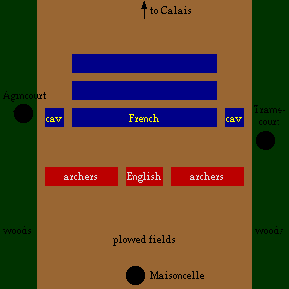All you Shakespeare fans know that St. Crispin's Day is the anniversary of the Battle of Agincourt. Today is the 591st anniversary of this battle from the Hundred Years War.
Of course, the Bard was no military historian. So here's a quick overview of the battle from the link above. (More detail may be found there as well.)
The Hundred Years War was fought because of claims by English monarchs on the French throne. In 1415, Henry V sailed to France for a season of campaigning. After a successful but long siege of Harfleur, he decided to march through the French countryside to Calais before returning to England. In spite of the political turmoil in France, various nobles marshalled their forces to block Henry's march north.
On 25 October 1415, the French forces blocked the road to Calais and challenged Henry to battle. The lines were drawn in some recently plowed fields between the villages of Agincourt and Tramecourt. English forces, weary and ill from the long march, were outnumbered by the French forces and appeared to be doomed. At first, the French waited; Henry ordered the English line to move forward to extreme longbow range and stop. The first round of arrows to strike the French ignited a calvary charge and the battle was joined.
The calvary charge was blunted by concentrated English longbow firing, the muddy field, and wooden stakes the English archers had driven into the ground. The French nobles, knights, and men-at-arms advanced on foot towards the English infantry. By the time they reached the English line, most were exhausted by the struggle through the mud. The French ignored the English archers (who were firing constantly) so as to gain glory by defeating the English nobles. Those French men felled by arrows or pushed to the ground were helpless because their heavy armor kept them from standing. The English line held while the lightly-armored (thus nimble) archers killed prostrate French. The battle turned into a rout and the French departed the field.
While sources vary, it appears that the English lost a few hundred men while the French lost several thousand. The English longbowmen certainly played a major role but the primary reason the French were defeated was their lack of a unified command. The French were provoked into an attack on unfavorable terms and no commander on the field had the ability to stop the charge. The English won the day; the French eventually won the war and expelled the English from France.

No comments:
Post a Comment